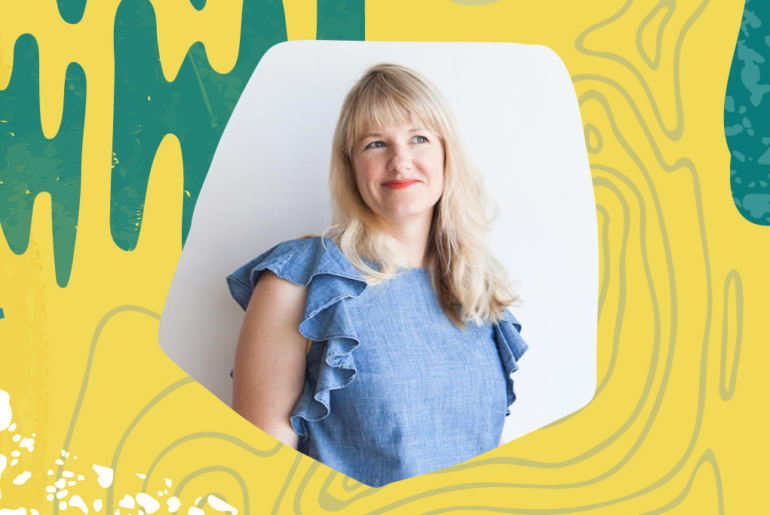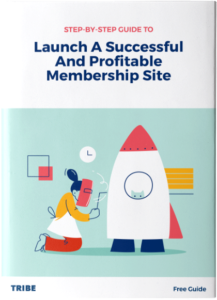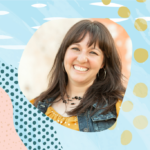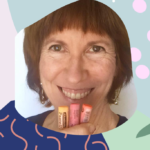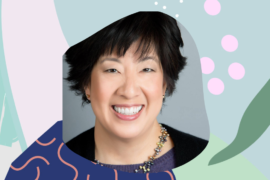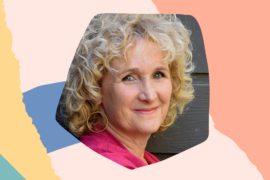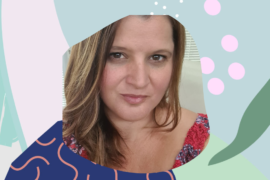Marisa Cummings got a degree in advertising because she feared she’d never be able to make a living as an artist. However, the older she got, the more inspired she felt to share her story as a self-taught artist and bring people along on that journey, which led her to create her first course.
Now, at The Expansive Artists, she provides aspiring artists with workshops, courses, and community to empower their own creative lives. She helps them confidently, consistently, and artfully sell online to their ideal collectors.
Today, Marisa joins the podcast to talk about the power of helping artists realize what they’re worth, mastering the art of improv to become a better public speaker, and how to lean in to your calling and make life-changing discoveries.
Key Takeaways
- How Marisa accidentally caught the entrepreneurial bug – and how the background she cultivated in advertising as a backup plan ended up serving her very well.
- What entrepreneurs and membership owners can learn from improv.
- Why the spotlight shines bigger when you are truly in support of someone else.
Free Give
FREE Guide – Launch & Grow a Profitable Membership Site
Ready to reclaim your time and attract more monthly paying customers? Our step-by-step guide will show you how to build a membership site that turns your passion into recurring profit. Click here to download!
Memorable Quote
- “The more you help somebody else, the more you shine yourself and the more all boats rise in the water.” – Shelli Varela
Episode Resources
Transcript
Read The Transcript
[INTERVIEW]
Shelli Varela: Marisa Cummings, already one of my favorite humans, you’re amazing. And welcome to the It’s a TRIBE Thing podcast, buddy. How are you?
Marisa Cummings: Thank you, Shelli. I am good and so happy to be here with you. It was a little vision I had to be on the It’s a TRIBE Thing podcast because as I just shared with you, this really was an introduction to what was possible for me with membership. And just I love hearing people’s stories. I podcast as well and it was wonderful and I thought, well, I would love to tell my story one day, so it’s kind of cool to be here. Thank you.
Shelli Varela: And I could talk to you for hours as we attested to, it’s like, okay, we better start recording.
Marisa Cummings: We’ll do it as fast as we can.
Shelli Varela: Yeah, I super appreciate you and all of the things you’re doing which is far beyond just the obvious, and we’ll get into that, but would you mind start starting with who you are, what you do, and who you serve?
Marisa Cummings: Yes. I am Marisa. I’m an artist based in Los Angeles, an artist and illustrator. I’ve also been a surface pattern designer. I’m also an author and podcaster. And I am passionate really from day one, I think that’s why I started podcasting without realizing that I wanted to, I have had this inner voice that’s always like, tell someone what you figure out. And it took me a while to realize that that was actually part of a gift that I have and to embrace that because I never thought of going into teaching or coaching or owning a membership.
It took me a minute to even believe I could be an artist and make a living because I ended up getting a degree in advertising. And I didn’t think I can make a living as an artist, but I started to question what I had been told. So, the short version of that is, that little nudge to share made me want to start chronicling my journey as a self-taught artist. And could I do this thing? Like could I be creative? Could I make a living doing what I love? Could I do it without a net? And what would happen if I invite people in on that journey?
And that grew into me becoming successful as an artist selling online, that led into teaching my first online course in 2008, which led to me serving artists in business and specifically, artists who want to sell online, sort of sell in their own terms because I’ve been a licensed artist, a published artist. I, with respect for those industries, believe that a lot needs to change. And when we are dealing direct with our collectors, which ultimately is what everyone does at the end of the day, whether you’re reaching tons of people through a book or one on one in a conversation, that’s everything for me, like my collectors and my relationship with my collectors, some of whom have been with me for 14 years, I’m not here without them, I wouldn’t even have any of those deals or books or anything without them.
So, I think I feel particularly passionate about that connection and cultivating that. And also, just the artists themselves, taking on the ownership and the confidence in selling for themselves and sort of, I know you’ll appreciate this, one of my members said, “You helped me rewrite the story of selling.” It’s not selling, we better like diminish whatever associations we have with that word, it is very much about connection that results in the sale. And for artists, in particular, it’s very often deeply personal and just putting that out in the world can feel very vulnerable. And I understand a lot of people just don’t want to deal with that, but I want to help them embrace it because there’s so much available to them, so much possibility, and so many people that you can impact by being able to then share your gift with them, which I know we’ll get a chance to talk about, but I meant to tell you, Shelli, brevity, not my thing. I’ll make it quick, but I go on inspired tangents.
Shelli Varela: Well, I love that. So, would you mind sharing that person that you were talking about, what was the reframe she had on sales before? And what did she learn and what was her new takeaway or the new story she decided to tell herself about that?
Marisa Cummings: Well, I think a lot of times, so as artists, we fall into very specific gifted camps. One is we have the gift that we create from whatever expression that can be, I put a lot under the umbrella of artists, creative like film, music, crochet, sewing, painting, clay, cooking, like everything. For me, podcasting is a voice expression, I call it, so writing obviously. And when we fall in one particular camp, well, one is our gift and one is the ability for some of us to share our gifts, to start teaching people how to do it.
And in this particular person’s case, she was very comfortable with sharing a lot of knowledge for free. I mean, we live in a world where it’s pretty amazing what we get and really cultivating that experience and then, parlaying that into a paid teaching offer, but somewhere there was a disconnect for her to apply some of that similarity to her own work as a product. In this case, it was a book, a collection of beautiful paintings that she had put together and that shift of realizing, wow, I just didn’t think I could apply a lot of what I was doing here to this, like, I had some resistance to the product and the actual art.
And then, there are other artists who have resistance to that and/or also to then feeling that their knowledge is worth sharing, which in the membership space, if there’s something to share with that is, don’t underestimate the gift that you have to actually guide someone else through your process. You can fall in both camps. And so, when she was able to realize that she could fall in both camps, I think that for her was the rewriting of that story, that it was okay to, it’s like, why do we think pitching our product is smarmy, like sharing our products? Like, this is just old stuff. I don’t even fully know where to unpack all of that, but we’re in the process in many levels of transforming that idea for people.
Shelli Varela: So, you talked about having, was it a collective or in Venice Beach we were speaking about your earlier days that kind of led you to what you’re doing now, can you walk us through that journey of how you got to be the person who said, you know what? I actually am going to go for the membership site and I’m going to figure it out. You talked about e-commerce and just like this tapestry of really cool different experiences that you have, that you bring together that are, that are typically unusual for them to be all connected and you just have this incredible synergy that you bring to your people. Can you walk us through how that came to be?
Marisa Cummings: Yes, the short trajectory was starting coming out with advertising which ended up serving me very well unknowingly as an entrepreneur, which I also did not know I would be. So, I knew I wanted to make a living, a good living, I wanted to own that and I want to own that now and help artists own it, like enough of any more stereotypes around that. So, I fully thought, all right, well, advertising people seem to make money so let’s do it. It’s creative and teaching me writing, graphic design. I took some art classes in college, like a few, but did not feel totally supported enough so it was sort of shut me down.
And I just leaned into the advertising which I excelled at, but then realized this is not an environment that I will flourish in. And so, I started researching other paths to take this knowledge and end up as a graphic designer in a tech company in the early 90s. So, I’ve had this very unique perspective of being an observer and having a career almost exclusively in the online space. And within that, I took a slight detour to interior design because I was renovating homes and have a passion for all things design, worked for one of my best bosses, during that time, learned so much about color and design and art.
And adventurous parlayed that into a move to Colorado, I was in Florida at the time. I moved to Colorado, became surrounded by entrepreneurs who were completely in the tech space in the early 2000s when the first internet bubble blew up and started attending every possible talk in Boulder with all these incredible entrepreneurs that had built these companies. I’m having a hard time working for people that don’t really want to let me flourish in the way I want and/or maybe they just didn’t know how to lead. Thankfully, we’re learning more about that today too.
But I had a fire to start my own e-commerce company and it was about 10 or 15 years ahead of this time, like blending interior design bloopers and getting them to their clients. The shipping wasn’t up to speed, it just wasn’t ready, but I got on the radar of some investors and it gave me confidence. And that confidence moved me to LA, I was trying to go to interior design centers and have all the design centers get on board. And when I went to LA, I don’t even know the answer to this, I just thought, I want to try acting.
Of course, like the thread of the journey was a discovery of wait a minute, if I can do these things, and what if I really want to believe in what’s possible for me? Then, what do I really want to do? And when I’m building this e-commerce company with a business plan and a board of advisors and the possibility of funding, if I’m going to do all this work, I want to love it even more. And I wanted to design my own work which brought me to Venice and I started designing chairs, like painted vintage chairs, so I wasn’t fully owning my own art expression, but I took what I knew design and interior design and painted these chairs and got into this cooperative gallery in Venice Beach on Abbot Kinney with a detour into improv.
I took improv at The Groundlings and the detour taught me that I don’t want to be an actor reading someone else’s lines, that’s not my passion, bringing that to life. My passion is creating on the fly. My passion is trusting my own creativity. And improv really, for reasons I don’t even fully understand, opened that creative expression in me.
Shelli Varela: So, if I can just paint a picture for everybody listening, The Groundlings is one of the most noted improv troupes, like Saturday Night Live pulls a lot of their people from The Groundlings. So, just to give context to, you said and by the way, I went to The Groundlings. That’s a very, very big deal.
Marisa Cummings: Well, I was not one, let’s just clarify. I live with one, so I know the process. They take about four years and go through hundreds, if not, I don’t know, thousands of students that go through to get to a pool of 20. To me, it’s like getting a Masters PhD in theater improv. They also do comedy sketch writing, but I stopped personally at the intermediate level, I was proud to make it that far. And I took it consistently for a year and a half. Yeah, I loved it.
Shelli Varela: And the thing that I love about improv and I know that we were speaking earlier that this so relates to entrepreneurs and especially those who are having the idea and being bold and brave in taking the first step, even though they don’t have it all figured out. But that whole context of the fear of the unknown is something as human beings that we not only share, but it’s also what we share in terms of it keeping us stuck. What do you think the gift of improv is, and just being in flow and being in the unknown, that as entrepreneurs and as membership site owners, would be super helpful for people to understand?
Marisa Cummings: Well, as seeing as how we’re also recording this in 2020, no net, like a comfort level with the fact that as much as we like to think it is and I’m saying that this year in particular showed us how uncertainty is a certainty in life. And when we can get comfortable with that to some degree and know that you can trust yourself, trust your voice, invite flow into your life, and let go. And this is not easy for me, I fully own that I’m a person who likes to be in control, I lean towards perfectionism. These are entrepreneurial, maybe, maybe not, they seem common, traits that we’re all trying to let go of because we care about what we do.
And it’s not that you don’t when you’re improvising, perhaps, or leaning into uncertainty, it’s just, boy, that was incredibly liberating. The thing about the Groundlings is you really don’t perform for a while, but I had an opportunity with a group to get on stage twice and I’ll never forget it. It was just life changing for me and it stopped me from being afraid on some level of just, if I can stand here in front of a room of people, I don’t know them, they’re here also to get entertained, which I don’t even know if I will be funny in this moment, that I could kind of do anything. If I could not know what I was going to do or say and stand up there, that’s like a worse nightmare for some. Public speaking is still a big fear for a lot of people. It’s like a worst fear.
And remembering that, even telling you the story now, we have to employ that as membership site owners, entrepreneurs all the time because as membership owners, you’re leading your community and you’re teaching and you’re maybe going on Live, you’re doing that with your marketing now, it’s highly recommended because people will get to know you so much faster. And you really got to be able to be okay with not knowing what you’re going to say maybe, or not having something feel as perfect as you want or feeling like what am I even doing here? Like, how am I doing this right now? Am I cut out for this?
Shelli Varela: Would you agree though, as a membership site owner, part of the magic of it is the person who runs it, it’s what they bring in. We’re talking about this incredible, diverse set of experiences you have and it’s art and it’s improv and it’s tech and it’s all of these things. And nobody ever in the history of the world will ever be you, will ever bring the gifts that you have. And in native culture, we call that your original medicine.
And I love what you said about improv because there is no rehearsing, there is no right or wrong answer, it is only being present and just fully in the moment and active listening and just being there with and for your people. And as somebody who runs a membership site, the people in your community, what they want more than anything is to be seen and to be helped and to be supported. And just for you to be with them in the trenches as they figure it out and solve it and make those leaps for themselves.
Marisa Cummings: Yeah, we talked briefly about your stage partner. So, in improv, you don’t improvise, really. You can do a one-man show, but you’re not improvising by yourself, you’re always doing it with someone else. And the most successful improv scenes are when someone is fully, all of the things you said, present, listening, and in support of their stage partner and wanting to help them shine and succeed which is just such an interesting concept because a lot of times, people think they’re in it for themselves, essentially, or being on stage, they’ve got to get the spotlight.
No, the spotlight shines bigger for everybody when you are truly in support of someone else. And to me, that is so much the gift of membership, exactly what you’re saying of how can I support someone else and help them flourish and help them shine and thereby, as a community, this is where we rise all together. There isn’t a limit that if you help this person, your stage partner does better, it works in tandem.
Shelli Varela: What seems counterintuitive that the more you help somebody else, the more you shine yourself and the more all boats rise in the water.
Marisa Cummings: Yeah.
Shelli Varela: If you are going to give somebody advice who is hearing this episode and inspired as I have been about not having it all figured out, but having that sort of calling where they’re thinking for the first time hearing your story, well, maybe it’s possible for me, maybe I could start membership site with the thing that I know and I love, and they’re hearing about all of your diverse experiences and looking at their own, what advice would you give that person who’s now thinking about taking the leap but maybe doesn’t know how or maybe even think it’s possible for them?
Marisa Cummings: Well, first of all, it’s possible for you. Let’s get that right out of the way, it’s possible for you. What you decide to do with that knowledge will be up to you and the first thing that I would encourage you to do is to not get in your head about what it needs to look like if you are right. I believe if you have a calling towards it, that that’s nudge enough because you’ll know, if you’re listening to this, you probably have the calling. So, I would encourage you to follow that.
And I would encourage you to lean into the fact that it’s going to be a discovery. There is no guidebook for the discovery. And I thank you, Shelli, for even the opportunity to share my story because I know you know this because you’re so great at reminding us of this. I forget that I’m this, like that you’re right, I don’t think I’ve met any other artists that’s quite like me. And a lot of times, when I started podcasting and then started teaching, I walked away from that. I excused it as my art business was growing which was great and it was because I was telling my story and because people could relate to that story and they believed because I demonstrated to them by example, what was possible for them as artists, I believe that for everyone.
And when I walked away, though, I realized that I reached a place where I thought, well, what do I have? Like other people started doing it better than me, I felt. What do I have really to offer? Why would someone want to listen to my podcast? Why would someone want to learn from me in particular, when so and so is doing so much better or has this many more followers or this many more art sales or whatever you want to fill in the blank.
And I think that while we live in an incredible time of awareness and knowledge and again, possibility to grow, it can be a real detriment when we take what’s happening in the world outside of us and use that as a reason not to even consider the possibility of being a membership owner, of guiding others. And just to what Shelli said, you are unique and you have a purpose, if you find that you have that call, which again, chances are, spoiler alert, you do, if you, and you’re listening here, you do. So, allow yourself to entertain that idea and cultivate it and know that you have that potential to truly have an impact on another person.
And to me, that’s where I get super sentimental about TRIBE and Stu’s message and the community I’ve met there. That ripple effect is so powerful, it can move me to tears. It’s like truly one of those things where we get in our own heads and when we do remember the person on the other side of this recording, if you’re listening right now and I make a difference for you and I was telling Shelli that listening to Anna’s story made a difference for me on this podcast.
If there is someone out there to be touched by and just impacted by your story to believe in something that is possible for them, it is a disservice not to consider this an option and I share this with my artists in business all the time. It’s wonderful if you want to make art and do it for yourself, I support that, I respect that, but if you too have the desire, the nudge to share it, there’s a reason because that visual, that written piece, that film that you make the dance, I do dance as well, that dance that you’re doing, that moves someone else and it moves them into believing in what I just shared with you, which is something’s possible for you. I think that we shut down when we don’t allow ourselves to genuinely believe in that for a moment, whatever that is for you.
Shelli Varela: Absolutely, I wholeheartedly agree. And you said something and I just want to tie it back as we wrap up, it’s tell somebody what you have figured out and it really is as simple as that because the truth is, struggle is the connective tissue between human beings and we can look at somebody who has that incredible success, but as we’re starting out, that’s not only going to be not helpful, it might be harmful because we don’t conceive that that incredible success might be possible for us.
But when we share our stories in a way that is vulnerable and real and we share the struggles and the warts and the ugly parts, that actually create something that allows movement and allows momentum. So, I want to thank you so much for sharing your story, your journey, and your amazingness. If people are looking to reach out to you online, where’s the best place they can find you and follow you?
Marisa Cummings: @creativethursday on Instagram and creativethursday.com. And yeah, Creative Thursday, that’s the name of my podcast. It’s been my brand name. It was meant to be an umbrella for all the creative ventures I would do. It was not going to box myself in. Even though primarily, I’m a painter, now, I did end up trusting that voice and transition my chairs and paintings because again, I saw people doing it around me and believed in what was possible for me. And yes, so Creative Thursday is where you can find me.
Shelli Varela: Awesome. Seth Godin says people like us do things like this. And I really love that in the community in the membership site, that becomes the norm. And so, thank you so much for hanging out with us. We love you to bits and you’re amazing.
Marisa Cummings: Thank you, Shelli. It’s an honor to be with you. I really appreciate it.
[END]
To learn more and get access to all episodes, visit our podcast page!
